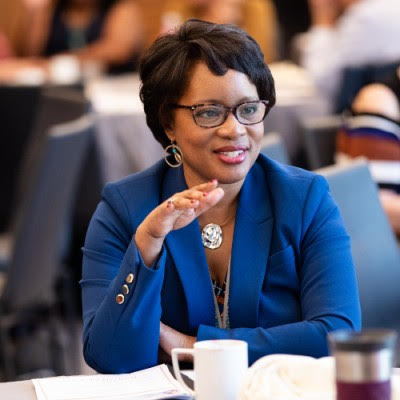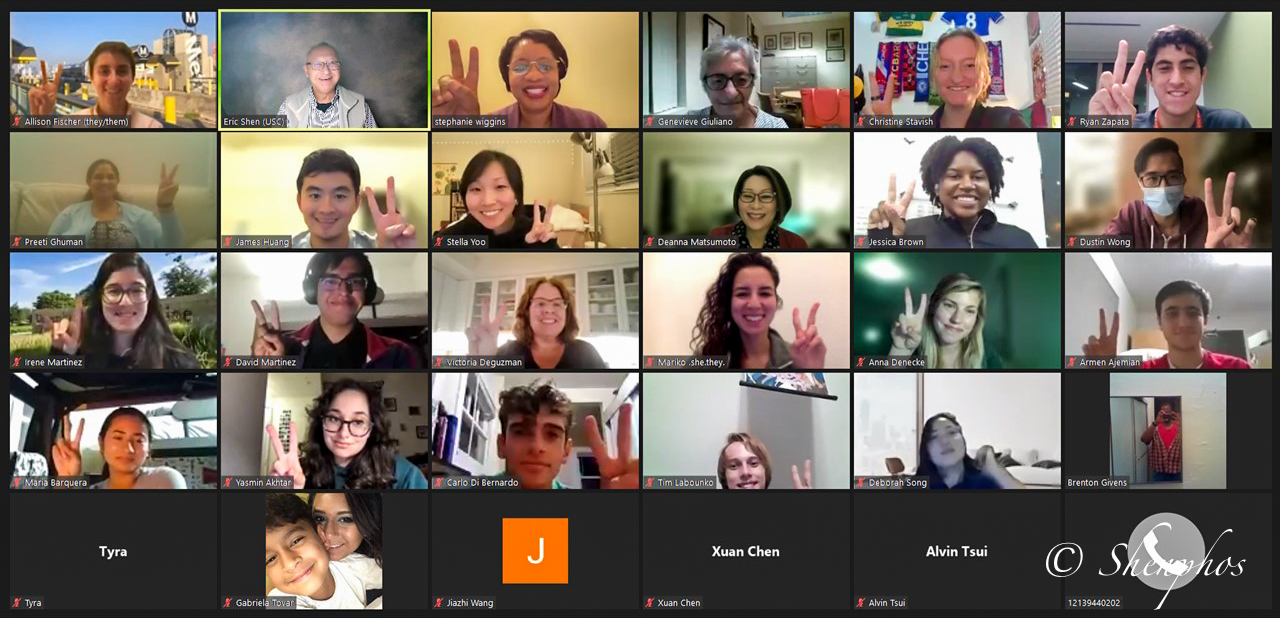News | METRANS and USC ITE Host Metro CEO Stephanie N. Wiggins
Stop the VideoNews

METRANS and USC ITE Host Metro CEO Stephanie N. Wiggins
Monday, January 31, 2022
by Yasmin Akhtar, BS, Real Estate Development, USC
On Wednesday, November 3, METRANS and the USC Institute of Transportation Engineers (ITE) Student Chapter hosted Stephanie N. Wiggins, CEO of the Los Angeles County Metropolitan Transportation Authority (Metro), to share her professional experience in the transportation sector and to discuss the current state of and future plans for Metro. Metro is a public transportation agency which serves as the transportation planner and coordinator, designer, builder, and operator for the county of Los Angeles. Ms. Wiggins is the first woman, and first African American woman, to lead Metro, a position she has held since June. Ms. Wiggins is the former CEO of Metrolink, a commuter rail network operating in Los Angeles, Orange, Riverside, San Bernardino, and Ventura counties. Among her many accomplishments, Wiggins piloted the HOT ExpressLanes Project that incorporated congestion pricing on existing carpool lanes on the I-110 and I-10 freeways in Los Angeles.

Stephanie N. Wiggins, CEO of the LA Metro
Ms. Wiggins shared that within her first 100 days serving as the CEO of Metro she conducted a “listening tour” speaking with employees, vendors, and customers along several of the rail and bus lines to gain a better understanding of the needs of individuals that interact with the Metro system. One of the biggest concerns brought up during the listening tour was that riders believe buses are too slow. Therefore, Ms. Wiggins placed a high priority on equipping buses with “bus rapid transit technology,” which includes detectors that communicate with traffic lights to prevent the light from turning red when a bus is approaching, allowing the bus to travel through the intersection, saving riders time. Additionally, Ms. Wiggins has pushed for more bus-only lanes along heavily traveled corridors. One recent accomplishment in the effort to ensure optimal flow of bus traffic in dedicated bus lanes is California Assembly Bill 917, sponsored by Assemblymember Richard Bloom (Santa Monica) and signed into law in October 2021. This law sets parking violations for cars that park illegally in the bus only lanes, with violations identified by cameras placed on the front of buses. This aims to speed up bus service and disincentivize improper use of the bus lane. There are 28 miles of dedicated bus lanes in the City of Los Angeles, so it is not hard to imagine that any improvements to the flow of these lanes can make a significant difference to the overall movement of travelers throughout the city.
Funding for Metro is a hot topic in public policy. Stephanie Wiggins credited the Measure M tax proposition to be a major accomplishment in the quest to fund capital improvements for Metro. Voters passed Measure M in 2016, financed by a half-cent sales tax, with 71% of the vote. Measure M allocates $66 billion for funding transportation projects in Los Angeles County for the next 4 decades, adding onto Measure R, which was passed in 2008 and continues to support transportation improvements. She also noted that the Reconciliation Bill currently being debated in Congress includes a new grant program of $9 billion that marries affordable housing and transportation and is jointly administered by the US Department of Transportation and Department of Housing and Urban Development. Eligible cities may receive funding for fareless and subsidized fares, she explained.
In order to increase transit accessibility, Ms. Wiggins detailed several Metro initiatives to make transit more affordable to the public. The Fareless System Initiative provides GoPass TAP cards to students at participating K-12 schools and community colleges, making transit free for eligible students. Similarly, the LIFE Program offers a fare discount program for low-income riders over 18. Additionally, in order to receive feedback from younger riders, Metro has created a Youth Council for teens ages 14-17.
As a woman of color working in the transportation sector, Ms. Wiggins placed much significance on “gender mainstreaming,” a concept that explores the impact of policy on gender equality. She noted that Metro On-Board surveys conducted between 2010 to 2018 show increases in female ridership on both rail and bus lines, while male ridership is decreasing, and that the surveys also found that women feel more unsafe on public transportation than men. Ms. Wiggins stated that Metro will be improving lighting at rail stations and bus stops in order to make transit safer and that Metro also plans to increase the frequency of buses to prevent delays for riders during peak mid-day travel times to decrease the wait time at stops.
A significant challenge on the horizon for Metro is the upcoming 2028 Los Angeles Olympic and Paralympic Games. Hosting these will require extensive infrastructure expansion to serve the needs of LA residents and spectators and Metro has a Mobility Concept Plan to bring permanent, long-term benefits to through projects already approved, funded and on schedule to be delivered before the Games. Ms. Wiggins noted that the infrastructure investment will benefit the region for generations, and that Los Angeles is still benefiting from the ‘84 Olympic Games. To prepare for the upcoming Olympics Games, Metro founded an Interdisciplinary Task Force, which aims to create a mobility plan for the Games. Metro aims to make the Olympics car-free for spectators, requiring collaboration with LA Tourism, among others.
Ms. Wiggins shared that she fully expects tourism to be back in full force soon, rebounding to perhaps even more than the 50 million tourists LA experienced before the COVID-19 Pandemic. Dustin Wong, a Public Policy student at USC, asked “What will Metro do to actively promote the system to foreigners and visitors coming to LA?” Ms. Wiggins replied that since the flood of visitors both domestic and international are generally unfamiliar with the Metro system, one important project being implemented for the Games is a transit ambassador program that places staff at Metro facilities and vehicles that can answer questions and give directions to tourists.
To wrap up the meeting, ITE Student Chapter Advisor Eric Shen asked Ms. Wiggins what advice she would give to students. She said, “Choose courage over comfort,” and emphasized the importance of taking risks and trying new things, as “you are growing when you try something new.”

Group photo of METRANS, the ITE Student Chapter and Stephanie N. Wiggins,
Fight On!
About the Author:
Yasmin Akhtar is a junior Real Estate Development student at the Price School of Public Policy with a minor in Spatial Sciences. Yasmin is interested in urban infill and transit-oriented development and hopes to create mixed-use sustainable developments when she enters the workforce after completing her studies. She works on the Newsletter team at METRANS.
News Archive
- December (1)
- November (6)
- October (4)
- September (2)
- August (3)
- July (4)
- June (3)
- May (7)
- April (8)
- March (11)
- February (8)
- January (7)
- December (7)
- November (8)
- October (11)
- September (11)
- August (4)
- July (10)
- June (9)
- May (2)
- April (12)
- March (8)
- February (7)
- January (11)
- December (11)
- November (5)
- October (16)
- September (7)
- August (5)
- July (13)
- June (5)
- May (5)
- April (7)
- March (5)
- February (3)
- January (4)
- December (4)
- November (5)
- October (5)
- September (4)
- August (4)
- July (6)
- June (8)
- May (4)
- April (6)
- March (6)
- February (7)
- January (7)
- December (8)
- November (8)
- October (8)
- September (15)
- August (5)
- July (6)
- June (7)
- May (5)
- April (8)
- March (7)
- February (10)
- January (12)















